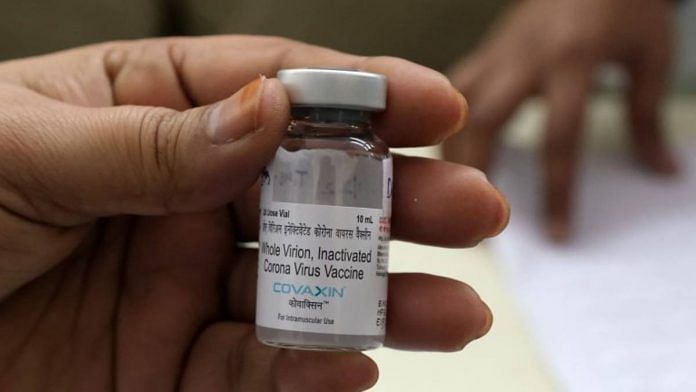New Delhi: Two doses of Covaxin administered at a 28-day interval showed a 50 per cent effectiveness against symptomatic Covid-19 among healthcare workers during India’s second wave, a new study published in The Lancet Infectious Diseases journal said.
Published Wednesday, the study is the first real-world assessment of the effectiveness of the Bharat Biotech vaccine (BBV152).
The study assessed 2,714 hospital workers from the All India Institute of Medical Sciences (AIIMS) in Delhi, who were most exposed to Covid and were primarily offered the BBV152 vaccine.
It looked at participants who were symptomatic and underwent RT-PCR testing for Covid-19 between 15 April and 15 May, when India was facing a devastating second wave.
The Delta variant was the dominant strain in India during the study period, accounting for approximately 80 per cent of all confirmed Covid cases, the researchers said.
Covaxin was approved for emergency use in India for people aged 18 and above in January. The World Health Organization (WHO) added the vaccine to its list of approved emergency-use Covid vaccines earlier this month.
“Our study offers a more complete picture of how BBV152 performs in the field and should be considered in the context of Covid-19 surge conditions in India, combined with the possible immune evasive potential of the Delta variant,” Manish Soneja, one of the researchers and additional professor of medicine at AIIMS New Delhi, said in a statement.
“Our findings add to the growing body of evidence that rapid vaccine rollout programmes remain the most promising path to pandemic control while public health policies must continue to include additional protective measures, such as mask-wearing and social distancing,” he added.
Also read: Organise workplace Covid vaccination to improve coverage, Centre advises states
Major findings
Of the 2,714 individuals in the study, 1,617 people tested positive for SARS-CoV-2 infection, and 1,097 tested negative.
Researchers found that the vaccine efficacy against symptomatic Covid after two doses of Covaxin, with the second dose administered 14 or more days before undergoing RT-PCR testing, was 50 per cent.
This effectiveness of two vaccine doses remained stable over the seven-week follow-up period.
The majority of eligible participants were tested for SARS-CoV-2 infection during the first 20 days of the 30-day study, when the Covid test positivity rate was at its peak in India.
Requests for testing gradually declined toward the end of the study — between 6 and 15 May.
The average time interval between getting the last vaccine dose and the end of the study period was 37 days for those who had received one dose, and 50 days days for those who had received two doses.
“Findings from the study confirm previous research indicating that two doses of BBV152 are required to achieve maximum protection and that all vaccine roll-out plans must follow the recommended dosing schedule,” Parul Kodan, one of the other researchers and assistant professor of medicine at AIIMS New Delhi, said in a statement.
“More research is needed to better understand how these findings translate to BBV152’s effectiveness against delta and other variants of concern, especially related to severe Covid-19 infection, hospitalisation, and deaths,” Kodan added.
Importance of real-world assessment
The researchers explained that the real-world effectiveness of the vaccine can often differ from controlled trial conditions. This is why assessing the efficacy is an essential component of any vaccine rollout plan.
The vaccine effectiveness estimated in this study is much lower than the efficacy reported in the phase-3 randomised control study of Covaxin, which was published earlier this month. During the phase-3 trials, the efficacy had been calculated to be 77.8 per cent.
Several factors may be responsible for the lower vaccine effectiveness in this study, the researchers said.
First, the study population only included hospital employees who were at a higher risk of exposure to Covid than the general population. Second, the study was conducted during the peak of India’s second wave, with high test positivity rates for both hospital employees and residents of Delhi.
The authors also said the prevalence of circulating variants of concern, especially Delta, may have contributed to lower effectiveness.
The study does not estimate effectiveness against hospitalisation, severe disease, and death, which require further assessment.
“Our study took place when the Covid-19 test positivity rate in Delhi was around 35 per cent — the highest since the beginning of the pandemic. It is an important factor to consider while interpreting the impact of any vaccine,” Naveet Wig, head of medicine at AIIMS New Delhi, said in a statement.
“Availability of a safe and effective vaccine, addressing vaccine hesitancy to achieve good pace and coverage are cornerstone to a successful universal vaccination programme,” Wig added.
(Edited by Amit Upadhyaya)
Also read: Covaxin, Covishield effectiveness highest when gap between doses is 6-8 weeks, ICMR study finds



